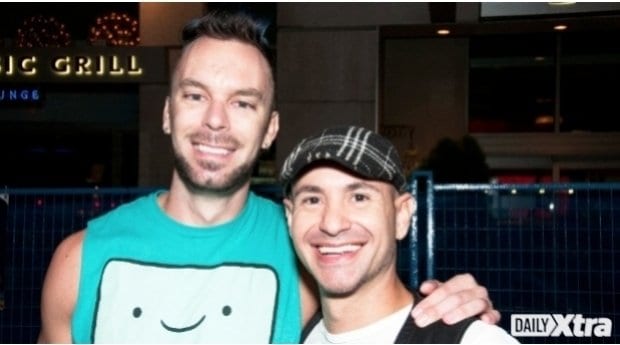The fencing that will enclose this year’s one-block beer garden at the Davie Street party Aug 1 will, in most places, be reduced to four feet from its original height of six feet, says Ray Lam, general manager of the Vancouver Pride Society (VPS).
Lam says the height reduction follows successful consultations with city staff and police.
The plastic meshing that enclosed the fencing has also been discarded, Lam says. “We’re able to remove the meshing, so we won’t have that feeling of the wall on Davie Street anymore.”
In addition to the beer garden, which will stretch from Burrard to Thurlow streets, the street party will include two additional blocks of open space featuring carnival games, about 40 vendors, and an all-ages dancefloor at the Davie and Bute intersection.
Lam told Xtra in June that, like many community members, the VPS never liked the fencing and was trying to have its requirement reduced.
“I definitely think this is a step in the right direction, and we’ve been moving in this direction for a couple years now,” Lam says. “Last year, we were able to take it down to two blocks of fencing with a mix of six-foot and four-foot fencing.” He says this year’s change to four-foot fencing almost throughout will allow for a more open atmosphere.
Vancouver Park Board commissioner Trevor Loke says he received a call from the VPS a week before Pride Week to ask about the possibility of removing the meshing and reducing the fence height. He says he called the city’s special events office and got it sorted out “within an hour.”
Lam says the April release of the new BC regulations promising to liberalize the province’s liquor laws made it difficult to change the VPS’s plans in order to accommodate a fenceless event this August.
“We already had vendors coming in; we already secured our suppliers at that time, so it’s really hard for us to change everything that fast,” Lam explains. “We’ve done the best we can with reducing the fencing and reducing the meshing, but there really isn’t a way for us to redevelop the entire plan and redevelop the entire budget with new suppliers, new security, new whatever else that we have to do to make it work.”
Lam anticipates a completely reformatted street party for 2015, as the VPS will have a full year to plan with the new regulations. Still, he’s doubtful there could be an “absolutely no fencing” plan in the future.
“Even with the new regulations, they say it’s a fenceless beer garden, but it’s only a fenceless beer garden if the entire site is fenced-in,” he says.
Loke says it depends on how the new regulations are interpreted. The city has been granted the authority to designate park areas as possible liquor zones, but whether that means fencing is required is something the province has not answered, he adds.
The city is willing to work with the VPS, he says, and if the organizers want a fenceless option, “we’d be willing to support that.” But it comes down to what the province says, he reiterates.
An emailed statement from the Ministry of Justice says recent changes to special-occasion licence (SOL) policies for site licensing still require a perimeter barrier, “such as a fence or natural feature or building wall.” It adds that a “second, smaller series of barriers is no longer required unless deemed necessary to ensure public safety.”
Barriers, such as fences, are required to help ensure that patrons do not take liquor outside a licensed area, the statement says. “Local government and police work closely with the Liquor Control and Licensing Branch to approve special events and may set the type and configuration of barriers depending on the nature of the event, taking into consideration various risk factors and local requirements,” it concludes.
An April 26 release from the Ministry of Justice heralded the changes to the liquor laws, saying, “gone are the days of cordoned-off beer gardens at family-friendly festivals in BC” and adding that new opportunities will be opened up for the province’s “multitude of festivals and special events.”
One of the first recommendations that went into effect allows for “whole-site licensing for public events, eliminating ‘beer gardens’” — except in situations deemed inadequate for public safety.
An April 28 policy directive also outlines the approval process for major special-occasion licences.
As for next year’s street-party planning, Lam says the VPS will explore ways of working with the new model. “We can maybe look at working with the bars more and having some of the establishments extend their patios. That’s a possibility we’ve been discussing. Another possibility is having a fence on Burrard and a fence on Thurlow and just use the buildings all along as fencing,” he suggests.
This year’s reduced fencing height means there will be a bigger security presence, Lam notes, since the VPS must prevent people passing drinks over the barrier. Contemporary Services Canada, an event management company that the VPS has worked with for four years, will provide security for the event.
“Their job is more in an ambassadorial role, so they’re there to make sure that people are having fun and that we’re still staying within the regulations; they’re very good with that,” he assures.


 Why you can trust Xtra
Why you can trust Xtra


